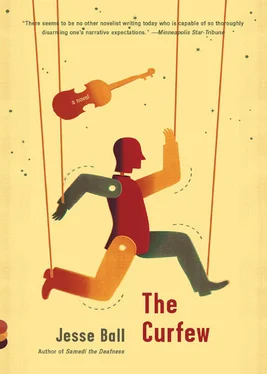— That should be gunfire. My apologies. Please recognize it as gunfire. Once more.
He disappears. Lawrence is again at the door. Louisa is composed, but extremely disturbed. William looks angry.
— News from out of town. They’ve set the congress on fire. The whole thing’s begun. The army is with them. The whole thing’s done. It’s useless.
Lawrence runs out into the street. He is holding his blue hat in his left hand. In the distance, the sound of gunfire.
William wraps an arm around Louisa. They shut the door. There is a painting there, and it draws the eye. The two pause there to inspect it, as if the answers lie therein.
It is a painting of a battle. There are rows of men with bright uniforms. There are cannon. Places have been dug out to foil the cavalry. Bodies are strewn between the various positions. The sky is bright in the distance, but dark overhead. A vulture is crouching on a colonel in such a way that it seems perhaps the vulture is the colonel. Nonetheless, it appears that the colonel is doing a marvelous job. He has won the battle. Why? The eyes of his troops are fierce and the others are as pale as mirrors. One can easily imagine the vast and beautiful columns of reinforcements arriving out of the east. The sound as they pound the road, as they draw nearer and nearer.
But for us there is no help, thinks William. He cannot say it, not to his wife. If he should do so, even once, it would immediately be true.
A voice:
— The next day conducted itself as usual; nothing had changed. There was no report of anything. Another day passed and another. A month passed. And then one day, soldiers marching up and down the streets. People hanged from telephone wires. The edicts posted. Interrogations of every kind along with new assignments of work. The whole thing turned on its head. The body of Lawrence found in a ditch outside town. He had lain there a long time before he was found. Compulsory attendance at so-called Section Meetings. A census conducted house by house. William and Louisa accepted the situation as best they could. William’s instrument was taken. The symphony was no more. It was turned into a courtroom. There was suddenly a need for many more courtrooms than had previously existed. A portion of the citizenry previously given short shrift now rode high and composed the various juries of various courts that tried every imaginable offense. In fact, there were so many offenses that one couldn’t avoid committing crime. One had to simply limit one’s time in the public eye, accept small penalties. All manner of symbols denoting various crimes were worn on one’s person. This was the period of transition. Things grew worse. The food shortages began. They had conversations, saying things to each other. He will say one thing and she will reply, or she will speak and he will answer. They reach out often without reason, and speak often without import. This is the nature of their concern.
And then one day
LOUISA was
TAKEN AWAY
FOR GOOD.
William is crying and pacing up and down in the rooms of his house. He does this for days, but the scene lasts one hour, with his quiet sobbing. In the next room a small mouse puppet is crying also, in an entirely different register. Meanwhile, in the street outside, people come and go. A group of men looking straight ahead. A boy with a brown paper bag. A dog with a blanket hung over its back. A car here or there, a bicycle. William is sitting on the clean bedspread, holding one of Louisa’s dresses. He is not pressing it to his chest, he is simply holding it. Mrs. Gibbons begins to cry softly, and the puppets begin to cry, one by one. The whole room is sobbing, except Molly, who sits bolt upright. Her hands are clenched. The next scene is about to begin.
CURTAIN
A BOARD WITH WORDS ON IT:
END OF ACTS ONE and TWO
and
INTERMISSION
A minute passes. Molly turns around in her chair. Mrs. Gibbons is missing.
— Pssst. Molly.
Molly sneaks a look over her shoulder. Mr. Gibbons, beside the theater, is motioning to her. She tiptoes over. The puppets look in a different direction.
— What do you think?
Molly pulls a scrap of paper out of her pocket.
*So far so good.
She pauses.
*Do you … You know, my father …
Looking over her shoulder as she is writing, he:
— I don’t know. We’ll just have to see.
*But …
— I wish I knew. I …
Into the room, then, Mrs. Gibbons with a mug of chocolate for each of them.
— TO YOUR SEATS, shouts the bailiff, he upon the highest turret of the theater.
Molly catches the edge of Mr. Gibbons’s mouth moving, just by chance, as her eyes haven’t left him. Ventriloquism, she thinks. And if he uses his ventriloquism to say my words through the mouth of another — what is that called?
She scratches her leg and hunches her shoulders.
— TO YOUR SEATS!
ACT THREE: to be conducted by LOTTERY of MEMORY.
The curtain sweeps open. The veiled jester is again upon his floor of clouds.
— I shall explain, he says. It will all soon be clear.
Each time he speaks with a different voice. Now he speaks with the voice of a scholarly nun calling a pupil to task.
— Molly. Molly! Come here.
Molly comes out from the side of the stage. Her tail is very long and gray. She walks on her hind legs and wears very delicately embroidered clothing. Her feet are clad in dancing slippers.
— Will you say a few words for the audience?
*There are certain days that shape a person’s life because they change a person’s understanding about what is possible in a day. This is why it is very important, for instance, as a child, to visit the house of a talented painter. I am speaking of a man or a woman who lives alone, knows no one, and paints while rivers and streams pass effortlessly in the vicinity unimpeded in a country of small bridges, lamps, and messages delivered by hand. My father brought me in secret to such a woman. She lived in the country and, being a hermit, was undetected by the revolution’s machinery. Her house was a series of cottages linked by little paths through the woods. She would sit and watch the light as a hunter watches a deer path — for days before she would act. And then, all at once, the circumstances imprinted upon the paper as if stamped with inked steel. Her work was all shadows and faint colors. My father said she was his violin teacher. She did not play the violin, or any other instrument, and, in fact, could not speak. Here is the painting she gave to me.
Molly opens the secret chamber of a brooch and takes out a square of paper. It unfolds eight times. From the side of the theater, an enormous magnifying glass draws out and slips into place.
One by one the members of the audience rise from their seats and inspect the painting. Molly gazes a long time. The shading, the shadows, the fragile hues: all as she remembered. It is a painting of a collapsed building. Underneath a shattered floor, someone has built a fire. That person’s back is to us, and he is reading a tiny leather book. The book is open on the palm of his hand.
Even the words of the book are visible, and these say:
Your trials will one day finish. You are young and will outlive your torturers .
CURTAIN
The audience returns to its seats.
THE CURTAIN SWEEPS OPEN
— It was a lovely day and it began well. There was a vendor selling nuts at the edge of the escarpment. They climbed past the ruined fortifications and walked on grassy ridges where small bushes claimed sovereignty. Ants ran like mice about their feet. They were ants! Ants dressed as mice. And in this, the machinery of the puppet show reveals its hand.
William and Molly come out onto the stage. She moves hesitantly. She is young yet, and somewhat fearful. William holds her hand firmly in his own, and is careful when shutting doors to be sure her tail is all the way through.
Читать дальше












